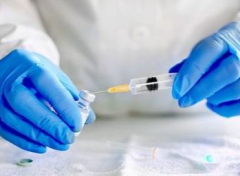Endometriosis: 200 Million People's Pain
March 28 is set as the Endometriosis Day. About 200 million women worldwide suffer from endometriosis, according to a report. Endometriosis is known as the undead benign cancer, which needs to be treated early.
Endometriosis, a disease that does not ease your mind, has a high incidence, accounting for up to 15% of women of child-bearing age. In order to successfully take it down, doctors did a lot of basic researches and discovered several unusual things about it that made it different from other gynecological diseases.

By no means a minority of women suffer from menstrual cramps, and one of the most common causes of menstrual cramps is endometriosis. This is a condition in which the linings of the uterus go out of the uterus. Most of them appear in pelvic cavity inside the abdominal cavity of the genital and adjacent organs, such as ovary, uterus, ligament, rectum, bladder, but also a few appear in the abdominal wall, nasal cavity, oral cavity, lung, kidney, ureter and other places far from the uterus.
The symptoms of endometriosis:
1. Pain during sexual intercourse: Endometriosis occurring in the uterorectal fossa and vaginal septum makes surrounding tissue swelling and influences sexual life.
2. Menorrhagia: When having inherent endometriosis, menstrual volume will be increased, and menstrual period will be prolonged. It may be related to the increased intima or ovarian dysfunction.
3. Dysmenorrhea: It is a common and prominent symptom, mostly secondary, that is, the patient's previous menstrual periods features no pain, but from a certain period, the pain begins to break out. After menstruation, ectopic intima gradually atrophies and dysmenorrhea disappears.

4. Symptoms of bladder: It is more commonly seen in patients with endometriosis to the bladder. They may have periodic frequency of urination as well as dysuria. When invading bladder mucous membrane, it can produce periodical hematuria.
5. Infertility: Pelvic endometriosis can often cause adhesion around the fallopian tube, affect oocyte pickup or lead to lumen blockage. On occasions, the ovarian lesions may affect the normal progress of ovulation, thus leading to female infertility.
Treatment of endometriosis:
1. Pseudopregnancy therapy
Long-term, continuous use of a larger dose of progesterone drugs can stop menstruation. Endometrium and ectopic endometrium react like pregnancy in response to drugs. There are many drugs used for this therapy, while they are still being developed. The main oral drugs are progesterone, provera, nemestran, and so on. The treatment must be carried out for at least six months before the heterotopic lining stops moving and eventually shrinks.

2. Natural medicine therapy
The herbal medicine Fuyan Pill is a natural formula that can help you improve the pelvic cavity. It can work well on treating inflammation, infection and diseased tissues, to effectively unclog the fallopian tubes and improve the female body immunity. It usually has no side effect or drug resistance, so females can use the medicine for a long period of time to fully improve their symptoms caused by endometriosis and body health.

3. Surgical therapy
When chocolate cysts occur on the ovaries, and the lesion tends to be larger in volume, or endometrial nodules with diameters greater than 2 cm are seen elsewhere, it is better to use surgical therapy. If the patient is young and childless, only the endometriosis lesions should be removed while the uterus and normal ovarian tissues are left, which is called conservative surgery. This approach preserves the possibility of fertility, but there is a greater chance of recurrence.
If the patient has children and she is older than 35 years old, the doctor can remove the lesions plus the uterus while the normal ovarian tissues are preserved, which is called semi-conservative surgery. This approach is better than conservative surgery in the long run, but it does not prevent recurrence as well.
If the patient is near menopause, or the endometriosis is too extensive, which becomes difficult to eradicate completely, then the uterus and ovaries should be removed together during the surgery, known as radical surgery. This method can make women completely infertile, so you need to think very carefully before choosing this method.
Self Check -- How To Uncover The Potential Endometriosis?
previous pageHow To Treat Chocolate Ovarian Cyst Caused By Endometriosis?
next page- Endometriosis and Debilitating Bowel & Bladder Pain: Diagnosis, Treatments, and Hope for Relief
- Struggling with Endometriosis Symptoms? Proven Back Pain and Painful Sex Relief Options
- Severe Endometriosis Treatment: Chronic Pelvic Pain Relief and Infertility Solutions
- New Endometriosis Pill Approved on NHS: What This Means for Patients and the Role of Traditional Chinese Medicine
- Can Endometriosis Be Endured Until Menopause?
Testimonials
- Adenomyosis with Ureaplasma Urealyticum Cured by Fuyan Pill
- Tubal blockage with hydrosalpinx can be cured by TCM shortly
- Fuyan Pill Helps A woman with Adenomyosis Get Pregnant
- A Woman with Hydrosalpinx Is Cured with Fuyan pill
- Pelvic Inflammatory Disease Testimonials
- Irregular Vaginal Bleeding and Endometrial Thickening Cured by Fuyan Pill
- Pruritus Vulvae and Frequent Urination: Mycoplasma Infection Cured after 2 Courses



